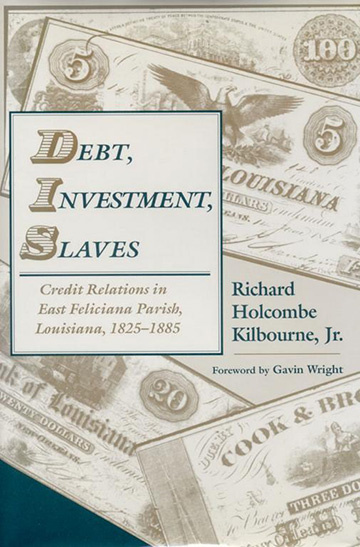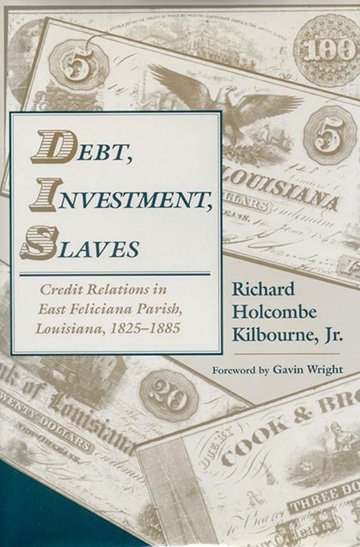
222 pages, 6 1/8 x 9 1/4
2 illustrations
Paperback
Release Date:01 Apr 2014
ISBN:9780817357757
Debt, Investment, Slaves
Credit Relations in East Feliciana Parish, Louisiana, 1825-1885
By Richard Holcombe Kilbourne; Foreword by Gavin Wright
University of Alabama Press
" . . . the only book-length study documenting the use of human collateral in the nineteenth century." —The Journal of Southern History
For his landmark Debt, Investment, Slaves, Louisiana attorney Richard Holcombe Kilbourne Jr. performed a thorough survey of parish mortgage records and other manuscripts to create a rich map of antebellum credit relationships in the region. He demonstrates that most credit relationships, collateralized and uncollateralized, were grounded in slave property and not, as a contemporary reader would assume, land or other forms of wealth. Antebellum slavery was thus not only an arrangement of labor, but also an arrangement of finance and economics that shaped all of Southern life and politics. For this reason, defeat in the Civil War and emancipation not only freed enslaved people to work and earn wages, it occasioned a monumental credit implosion from which the Southern economy did not recover for the remainder of the nineteenth century.
To understand the antebellum South, it is necessary to set aside assumptions shared by modern Americans about the nature of borrowing, lending, banking, and investing. Kilbourne's seminal work reminds readers of the absence of banks outside of major cities like Charleston, New Orleans, and Mobile. He explains the defined and ad hoc roles that regional banks, intermediary lenders, and flexible agents ("factors") played in the absence of a robust banking system. He persuasively shows that this network of borrowers and lenders was based to an extent not well understood today on bondage. He then demonstrates how this fragile and improvised financial system had no ability to respond to the shocks and disruptions of war.
Setting out to write a book of local history, Kilbourne achieved an enduring work that illuminated aspects of Southern life that are indispensable to understanding American history.
For his landmark Debt, Investment, Slaves, Louisiana attorney Richard Holcombe Kilbourne Jr. performed a thorough survey of parish mortgage records and other manuscripts to create a rich map of antebellum credit relationships in the region. He demonstrates that most credit relationships, collateralized and uncollateralized, were grounded in slave property and not, as a contemporary reader would assume, land or other forms of wealth. Antebellum slavery was thus not only an arrangement of labor, but also an arrangement of finance and economics that shaped all of Southern life and politics. For this reason, defeat in the Civil War and emancipation not only freed enslaved people to work and earn wages, it occasioned a monumental credit implosion from which the Southern economy did not recover for the remainder of the nineteenth century.
To understand the antebellum South, it is necessary to set aside assumptions shared by modern Americans about the nature of borrowing, lending, banking, and investing. Kilbourne's seminal work reminds readers of the absence of banks outside of major cities like Charleston, New Orleans, and Mobile. He explains the defined and ad hoc roles that regional banks, intermediary lenders, and flexible agents ("factors") played in the absence of a robust banking system. He persuasively shows that this network of borrowers and lenders was based to an extent not well understood today on bondage. He then demonstrates how this fragile and improvised financial system had no ability to respond to the shocks and disruptions of war.
Setting out to write a book of local history, Kilbourne achieved an enduring work that illuminated aspects of Southern life that are indispensable to understanding American history.
A major contribution to our understanding of the economic role played by slave property.’ —Tony Freyer, The University of Alabama School of Law
' . . . the only book-length study documenting the use of human collateral in the nineteenth century.' —Bonnie Martin, The Journal of Southern History
This very detailed case study makes a strong argument that we can dismiss the idea of an antebellum South crippled by debt. Instead, slaves were used as collateral to produce an economically health and flexible credit system—a system, however, which collapsed with the fall of slavery.’ —Michael Tadman, University of Liverpool
Richard Kilbourne, a practicing lawyer and the author of two previous books dealing with aspects of credit and the law in Louisiana, has written a meticulously researched case study of how antebellum farmers and planters in East Feliciana Parish, Louisiana, financed their operations and then how they responded to the shock of change brought by emancipation. . . . Historians seeking a better understanding of credit relations in the nineteenth-century South and the effects these relations had on the antebellum and postbellum Southern society and economy cannot ignore this important book.’ —Louisiana History
Richard Holcombe Kilbourne Jr., is a partner in the Kilbourne Law Offices, Clinton, Louisiana. Gavin Wright is Professor and Chair of the Department of Economics at Stanford University.




